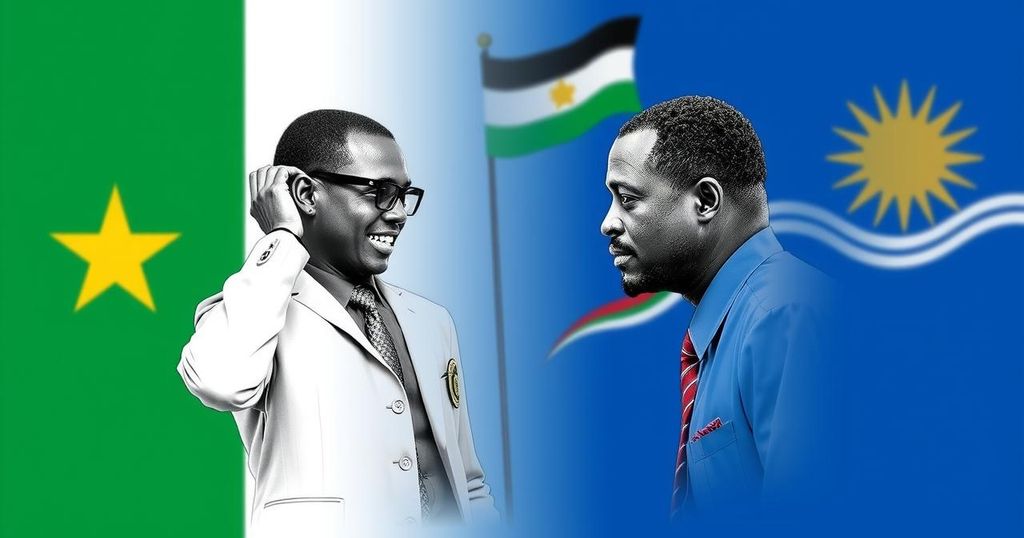SWAPO Faces New Challenges in Namibia’s Election
SWAPO faces challenges in Namibia’s elections, with declining support in 2019 highlighting the fragility of its position as ruling party. The opposition remains fragmented but the IPC and AR show potential to emerge as significant contenders, while Netumbo Nandi-Ndaitwah aims for a historic presidency as the first female candidate. Current voting trends suggest SWAPO may remain dominant, but changes are evident in the political landscape.
In the wake of Namibia’s presidential and parliamentary elections, the South West Africa People’s Organisation (SWAPO) is facing significant challenges for the first time since its inception in 1990. Historically strong in the northern regions, SWAPO encountered a decline in support during the 2019 elections, losing its two-thirds majority. This trend mirrors a broader decline in support for ruling parties across Southern Africa, as seen with the dwindling influence of the African National Congress in South Africa and the unrest in Mozambique following contested elections.
The fragmented nature of the opposition, consisting of 21 parties in the latest parliamentary elections, provides SWAPO with an advantage. According to political analyst Rui Tyitende, the fragmentation stems more from personal rivalries than ideological differences, resulting in no cohesive alliance opposing SWAPO. This disunity allows SWAPO to maintain its foothold even amidst significant electoral setbacks.
Netumbo Nandi-Ndaitwah, the country’s current vice president and a prominent political figure since independence, is running to become Namibia’s first female president. Nandi-Ndaitwah promises to tackle youth unemployment and invest an ambitious sum in job creation. Critics, however, have raised concerns regarding the feasibility of her objectives amidst a challenging economic climate.
Key opposition figure Panduleni Itula of the Independent Patriots for Change (IPC) poses a notable challenge to SWAPO. Itula garnered 30% of the vote in the 2019 elections as an independent candidate, making him a significant contender. Nevertheless, Itula’s foreign ties and the symbolism of a non-indigenous first lady may hinder his acceptance among some voters, reflecting historical sentiments stemming from colonial rule.
Despite the challenges, experts forecast that IPC may secure its position as the primary opposition party in the upcoming elections, alongside the emerging leftist party Affirmative Repositioning (AR), further complicating the political landscape for SWAPO. As the election process unfolds, preliminary voting data suggests that despite these pressures, SWAPO is still projected to lead, although the emergence of strong opposition could signal a shift in Namibian politics.
The Southern African region has seen a shift in political dynamics, with long-established ruling parties losing influence amid growing public discontent. In Namibia, SWAPO, which has led the country since gaining independence, is experiencing significant pressures as evidenced by its dwindling support in recent elections. The 2019 elections marked a turning point for SWAPO, as it recorded its lowest electoral support in history, leading to increased fragmentation in opposition parties and internal challenges. This article analyzes the current political climate, introducing Netumbo Nandi-Ndaitwah as a potential first female president and examining the emerging opposition parties that could reshape the political landscape in Namibia.
In summary, Namibia’s electoral landscape is poised for potential shifts as SWAPO confronts new challenges from a fragmented opposition. The upcoming elections will not only test SWAPO’s longstanding dominance but also reveal the capacity of new political movements to impact governance. If the IPC and AR succeed in mobilizing voter support, Namibia may witness a significant political transformation, altering the trajectory of its ruling party and opening avenues for more diverse political representation.
Original Source: www.dw.com




Post Comment